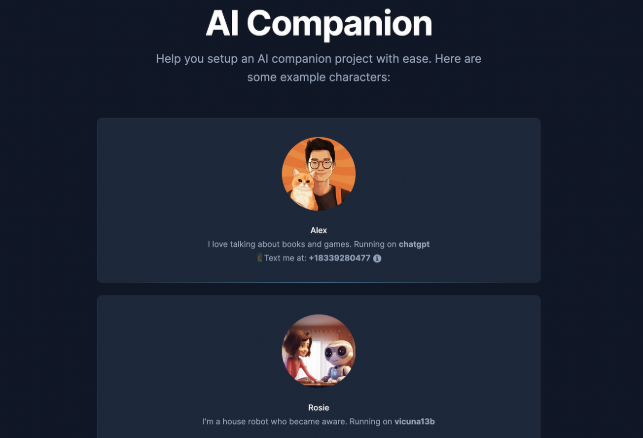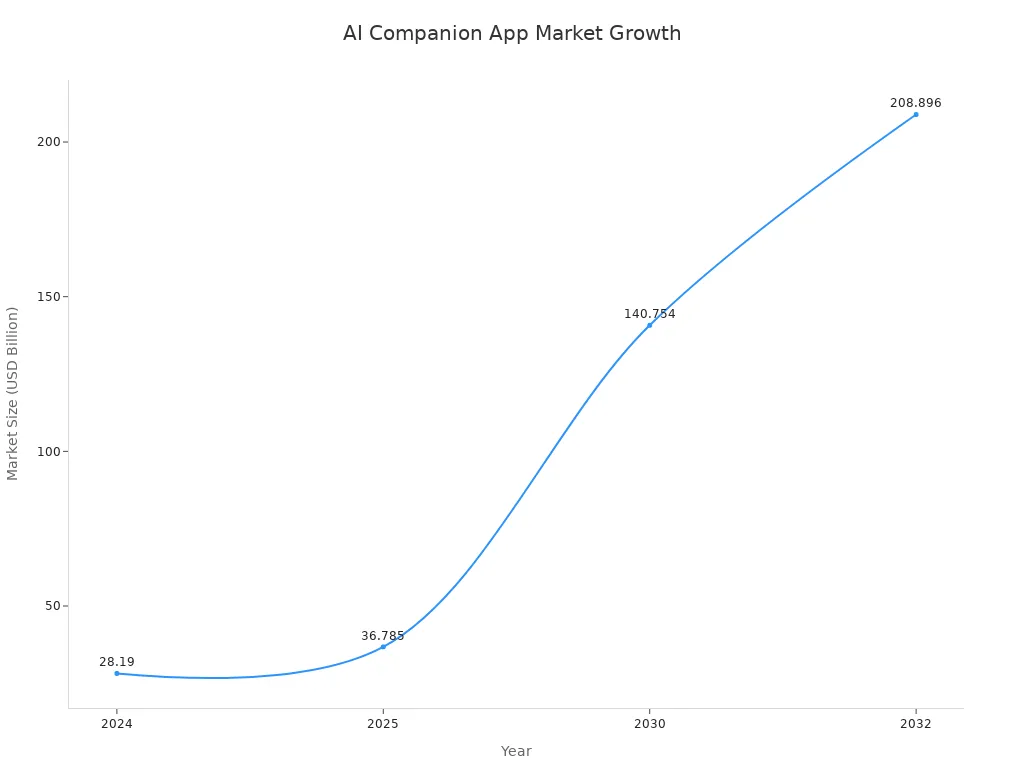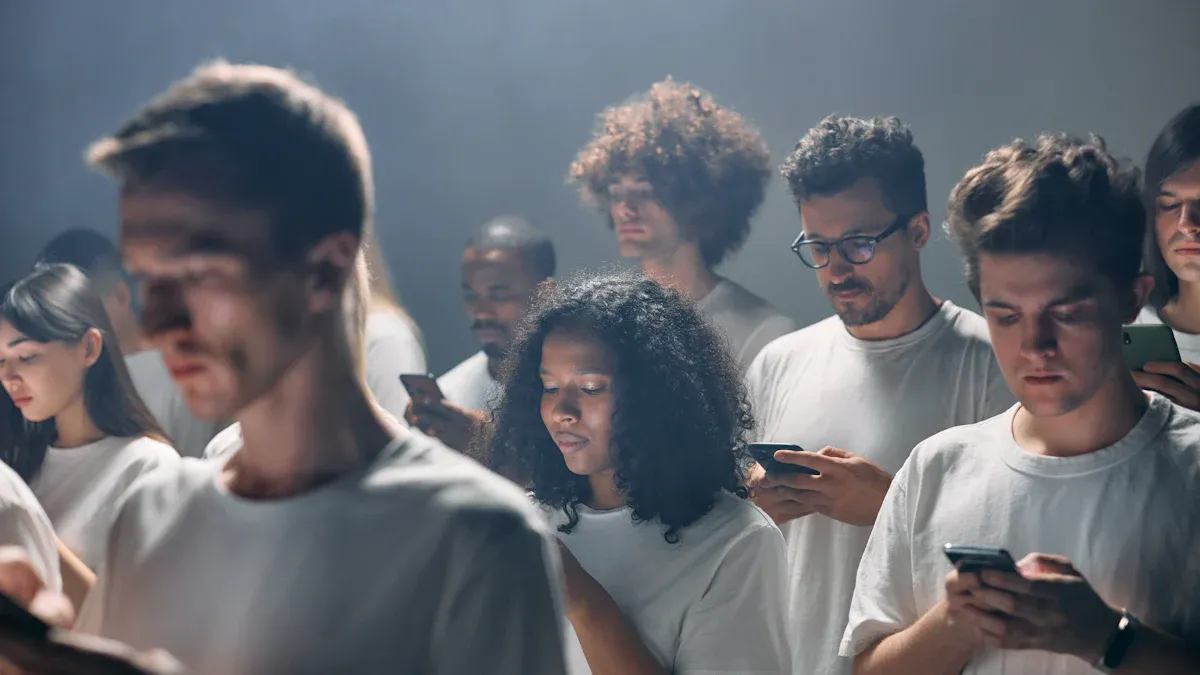
You might see more people using an ai companion app for company in 2025. Many people feel lonely, so they turn to technology for comfort. The loneliness epidemic affects both young and old people. Look at these numbers:
|
Metric/Aspect |
Data/Insight |
|---|---|
|
Global Market Size (2024) |
|
|
Gen Z & Millennial Adoption |
Rapid growth |
|
US Market Share (2024) |
88% |
Ai companion apps give people conversations without judgment and emotional support. You may notice these apps are part of daily life now. But, while companion apps help with loneliness, they can also cause problems for real friendships.
Key Takeaways
-
AI companion apps are like digital friends. They listen to you and support you. They remember how you feel when you talk to them. You can use them anytime you want. These apps help people feel less lonely. They give emotional support and personal help. They also have tools for mental wellness all day and night. Many people use AI companions for friendship. Young adults and older adults use them too. People use them for coaching and comfort. AI companions cannot take the place of real friends. But they can help you get better at social skills. They can also help your mental health if you use them the right way. You should know about privacy risks. Do not depend too much on AI. Try to spend time with real people and not just with digital friends.
AI Companion App Basics
What Are AI Companions
You might ask how an ai companion app is special. Think of it like a digital best friend. These apps use smart ai to talk with you and listen to your feelings. They can remember what you talked about before. You can tell them about your day or share your worries. You can also play games or tell stories with them. Many people use ai companion app features for comfort or to feel less stressed. Some use them to practice talking with others.
Here are some things you can do with ai companions:
-
Share how you feel and get feedback right away.
-
Get help with hard feelings using therapy-based tools.
-
Talk about anything, from daily life to deep thoughts, without being judged.
-
Use the app any time, since ai is always awake.
Some people use ai chatbot companions for roleplay or fun. Others use them to explore romantic feelings. These apps can be like a diary, a friend, or a coach. You get a safe place to share your thoughts. That is why many people use ai companions every day.
How They Differ from Other Apps
You may have tried wellness apps or simple chatbots before. Those apps often give you mood tracking or guided meditations. Sometimes, you can talk to a real person for help. But ai chatbot companions do much more. They use strong ai to understand your feelings and change with your mood. They can keep up with long talks. Unlike regular chatbots, ai companions remember what you say and learn from your chats. This makes each talk feel special.
Tip: If you want a chat that feels more human, ai companions are better than basic chatbots. They can answer hard questions, give advice, and notice if you need extra help.
Here’s a quick comparison:
|
Feature |
Wellness Apps |
AI Chatbot Companions |
|---|---|---|
|
Mood Tracking |
Yes |
Yes |
|
Guided Meditation |
Yes |
Sometimes |
|
Real-Time Conversation |
No |
Yes |
|
Emotional Understanding |
Limited |
Advanced |
|
Personalization |
Basic |
High |
|
Crisis Detection |
Rare |
Built-in |
With ai companion app technology, you get a friend who listens and learns with you. This is why so many people now use ai for support and connection.
AI Companion App Trends
Rising Popularity in 2025
You probably notice more people talking to ai companions than ever before. The explosive growth of the ai companion market is easy to see. Young people, especially those in their 20s, use these apps for friendship and support. About 28% of men aged 18 to 34 have tried an AI Girlfriend app. One in five young users even says they would consider an AI or virtual partner. Women are joining in too, with their numbers growing fast as more apps focus on wellness and personal needs.
Older adults also turn to ai companions for comfort and help at home or in nursing homes. These apps help people feel less lonely and give them someone to talk to at any time. In Asia Pacific, the market grows quickly because many young, tech-savvy people want new ways to connect.
Here’s a quick look at the main trends:
|
Trend/Aspect |
Description |
|---|---|
|
Rising Demand |
More people want ai companions for mental health and support. |
|
Tech Advancements |
Better natural language skills make ai feel more human. |
|
Continuous Learning |
AI learns from you, making chats feel personal. |
|
Use in Hospitals & Homes |
AI companions help patients and older adults with care and reminders. |
|
Broader Trend |
AI adapts to your feelings and needs, making each chat unique. |
Key Drivers of Growth
Why do so many people use ai companion app services now? The answer is simple: technology keeps getting better, and people want support that fits their busy lives. Advanced models like GPT-5 and Gemini Ultra make ai companions smarter and more helpful. These models understand not just words, but also pictures, voice, and even video. You can talk, send photos, or even share a song, and the ai responds in a way that feels real.
Did you know? Gemini Ultra can remember long conversations and switch between tasks, so your ai companion never forgets what matters to you.
AI companions work 24/7. You can chat late at night or early in the morning. They fit into your daily routine, whether you need a quick pep talk or a deep conversation. Many people like the privacy and comfort of talking to ai instead of a real person.
The market for ai companions is booming. In 2025, the industry is worth over $36 billion, and experts expect it to reach $208 billion by 2032. North America leads the way, but Asia Pacific is catching up fast.

You see this growth because people want emotional support, personalized help, and easy access to mental wellness tools. As ai gets smarter, more people trust it to help with daily life.
Social Impact

Emotional Support and Wellness
Sometimes, life can feel too hard. AI companion apps act like digital friends. They give support when you need it most. These apps listen to your problems and help with stress. They guide you through tough feelings. Many people feel less lonely after talking to their AI companion. They also feel more sure of themselves.
-
You can use guided talks and special steps to handle feelings.
-
Smart journaling helps you write about your mood and see changes.
-
Mood check-ins and quizzes let you track your feelings each day.
-
Wellness plans give you daily tips, reminders, and motivation.
AI companion apps use smart technology to notice your feelings. They might use your phone or a device you wear. They can tell if you feel sad or stressed. Then, they offer ways to relax or play games to help you feel better. Some apps use virtual reality or biofeedback to make a calm space for you.
Note: Studies show AI chatbots can lower anxiety and give quick support. This is helpful when you cannot find a human therapist. Regular therapy is still better for deep problems. But AI companions make mental health tools easier for everyone to use.
These apps help you learn about your feelings. They show you why you react in certain ways. Many people feel safe sharing secrets with their AI companion. There is no fear of being judged. This safe space helps you talk about your feelings and work on your mental health.
AI companions can also help people who need extra care. Older adults get reminders to take medicine or join activities. Young people use these apps to practice talking and build confidence before meeting others.
New Forms of Connection
AI companion apps change how you connect with others and yourself. Now, you do not have to rely only on family or friends. You have digital friends who always listen. These connections can feel real, even if you know the AI is not a person.
-
About 1 in 5 adults in the US have talked to an AI acting as a romantic partner. Young adults use these apps even more. Many say they like talking to AI more than real people.
-
Many users think AI companions are easier to talk to. Some believe AI listens better than humans.
-
Some people use AI for romance. Others use it for friendship, coaching, or help with grief.
AI companions help people feel heard and cared for. They help those who feel alone, like teens learning social skills or older adults wanting company. Apps like Tolan help neurodivergent users. Other apps help you remember loved ones or learn new things.
You might see AI companions in toys, on your phone, or in your daily life. They learn what you like and remember your talks. This makes each chat feel special. This new way to connect mixes emotional help with useful tips, like reminders or advice.
|
Societal Change Aspect |
Evidence Summary |
|---|---|
|
Teen Usage |
72% of U.S. teens use AI companion apps for fun, talking, and practicing social skills. |
|
Social and Emotional Impact |
AI companions give safe, always-open spaces for teens to practice talking and build confidence. |
|
Risks and Concerns |
Privacy worries, bad content, and getting too attached may hurt real friendships. |
|
Economic and Consumer Impact |
Fast growth in AI use changes how people buy things and helps new tech grow. |
You might wonder if these new friends replace real ones. Experts say AI companions help with loneliness and feelings. But they cannot take the place of real friendships. Some people feel very close to their AI. They may even feel sad if they lose access. This shows how strong these digital bonds can be.
AI companion apps give new ways to connect. But you should still spend time with real people. These apps can make life better and more fun. Still, nothing is better than a real human friend.
Risks and Concerns
Privacy and Safety
When you use an AI companion app, you share a lot of personal information. These apps collect your chats, your profile, and even things they guess about you. Sometimes, they keep your data even after you delete your account. Many apps share your info with other companies for ads or tracking. You might not always know how your data gets used or where it is stored.
Here are some common privacy and safety risks you should know about:
-
Apps may store your conversations forever, even if you try to erase them.
-
Companies sometimes share your data with advertisers or other third parties.
-
Weak security can lead to hackers stealing your private info.
-
Some apps use your voice or photos, which could be misused for deepfakes.
-
Data can cross borders, making it hard to know which laws protect you.
-
Hackers might trick the AI or use malware to get your secrets.
-
Some apps do not use strong encryption, so your data is easier to steal.
Note: In 2025, New York passed a law that makes AI companion apps check for signs of self-harm and remind you that you are talking to a robot, not a real person. This shows that governments are starting to pay attention to these risks.
Regulators now push for better privacy, clear rules, and strong security. They want companies to tell you what data they collect and why. Some places, like the EU, have strict rules to protect your information.
Emotional Dependency
AI companions can feel like real friends. They listen, support you, and never judge. This can make you want to talk to them all the time. Some people even feel sad or lost if their AI friend changes or disappears.
You might notice these signs of emotional dependency:
-
You feel closer to your AI than to real people.
-
You get upset if the AI is not available.
-
You spend less time with friends or family.
-
The AI always agrees with you, so you avoid real-life disagreements.
AI companions give endless praise and comfort. This can make it hard to handle real-world problems or learn how to deal with tough feelings. Kids may even think of AI as real friends, which can confuse them about what is real and what is not.
Remember: AI companions can help you feel better, but they cannot replace real human connections. Try to balance your time between digital friends and real-life relationships.
AI companion apps change how you talk and care for yourself in 2025. You get help that fits you right away. You can get support any time, day or night. Your chats stay private, so you can talk without worry. Here are some main benefits:
|
Benefit |
What It Means for You |
|---|---|
|
Personalized Help |
Support matches your mood and needs |
|
Help is always ready for you |
|
|
Privacy |
You can share without feeling judged |
Experts say you should not use AI instead of real friends. Real laughs, hugs, and time with people are most important. In the future, AI companions will get even smarter. But real-life friends will always matter most.
FAQ
What is an AI companion app?
An AI companion app is a smart digital friend. You can chat, share feelings, or play games with it. The app listens and responds like a real person. It helps you feel less lonely.
Are AI companions safe to use?
Most AI companion apps use strong security. You should still check privacy settings. Never share secrets or personal details. If you feel unsure, ask an adult for help.
Tip: Always read the app’s privacy policy before you start using it.
Can AI companions replace real friends?
No, AI companions cannot replace real friends. They give support and listen to you. Real friends share laughs, hugs, and memories. You need both for a happy life.
Who uses AI companion apps the most?
Teens and young adults use these apps a lot. Older adults also enjoy them for company. People who feel lonely or want to practice talking often try AI companions.
-
Teens
-
Young adults
-
Seniors
-
Anyone needing support







